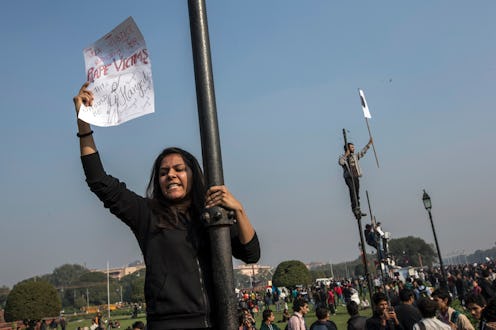News
India's Gun Solution To Rape Won't Work
On Wednesday, India announced that it is designing its first gun for women. Just to recap, the 32-caliber revolver, which is thoughtfully hand-bag-sized and comes in a maroon jewelry case (because aesthetics matter above all else) costs $2000. It has the backing of the Kanpur chief of police, Ram Krishna Chaturvedi: "If you have a licensed weapon, it increases your self-confidence and creates fear in the minds of criminals," he said.
There are so many problems with that statement I don't know where to pull on it and let it all unravel first. But let's start with the notion that carrying a weapon gives you self-confidence: The idea that you're somehow protected from rape just by sheer virtue of carrying a gun requires, firstly, for the potential attacker to know you have a weapon. Given that the high cost of the gun means only the wealthier middle and upper class women can own it, it's hardly going to protect most of India's 614.4 million female population. In which case, if you're planning a sexual assault in India, then you can bet that the woman you're looking to attack isn't armed. So much for "planting fear."
Let's say though, that you are one of the lucky few women with a weapon in your purse. Does that really mean it's easily accessible? After all, in the event of an attack, you've got to somehow be able to slip your hand into your purse to get that gun out of its stylish case before you can even shoot it. And then there's the small matter of being able to actually use the firearm in such circumstances — the kind of circumstances police undertake rigorous training to even deal with.
Direct action could come from a grassroots movement that gives women a sense of destiny over sexual violence in India. Unfortunately, of course, even this kind of citizen's justice isn't real justice. And neither would the women's gun solution be.
Last year, stories about gang rape in India began proliferating international media. The murder of Jyoti Singhi in December 2012 hit the headlines first, then there were the cases of a British tourist who jumped out of her New Delhi hotel room to flee rape in the weeks following; an American tourist who was gang-raped in North India in June 2013; and a photojournalist, again, gang-raped, in Mumbai in August.
In response to national and international outcry, new rape laws were passed in March 2013 in a quick bid to respond to Singhi's murder. But despite extending protection against stalking, voyeurism, and sexual harassment — and extending the death penalty to rape that resulted in death — the new laws failed to include the concept of marital rape. That oversight seemed to pinpoint what was at the core of India's rape problem; it was dealt with as a government embarrassment, not as an issue endemic to the lives of so many of the country's women.
But before all of that, groups of female vigilantes took it upon themselves to provide India's women with the protection the country's police and justice system seem to be denying.
Trained in self-defense, and often offering classes to women, they also took it upon themselves to challenge men they saw guilty of sexual harassment in the street, and to publicly humiliate them if they persisted. It was a drop in the ocean when it comes to dealing with the problem of securing rape convictions and in challenging a society where euphemistic language—"outraging the modesty of a woman" still refers to sexual assault in the law. But what it proved is that direct action could come from a grassroots movement that gives women a sense of destiny over sexual violence in India. Unfortunately, of course, even this kind of citizen's justice isn't real justice. And neither would the women's gun solution be.
In both cases, women in India are failed: not by a lack of vigilantism or weapons but by a legal system that is not fair enough to them, and by a society that has not yet done enough to condone sexual violence.
It's easy to see India's gun solution as risible. But the fact is, women are done a huge disservice the world over by sexual violence. And the real smoking gun is the pressing need in every country on earth for an end to it — by putting the onus on attackers, not victims, and ensuring efficient legal protection.
